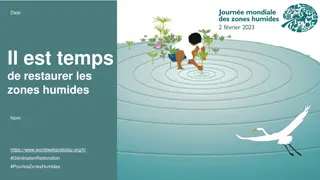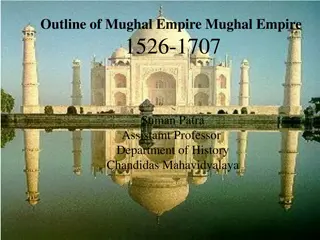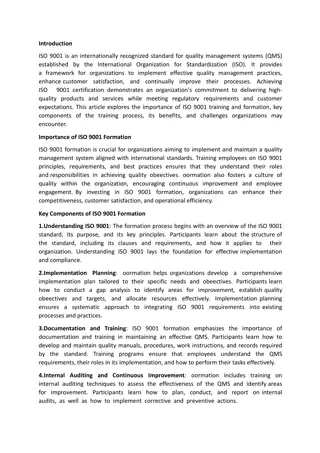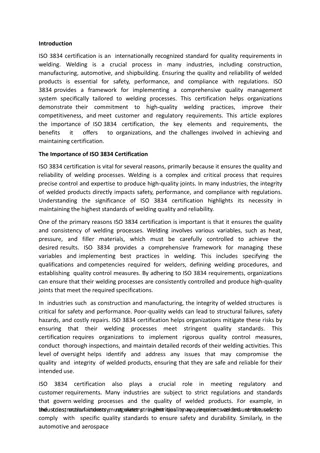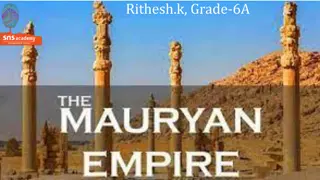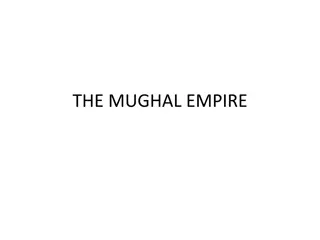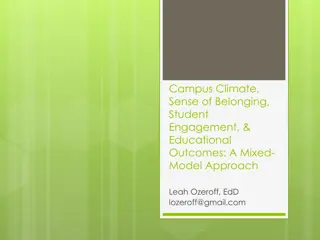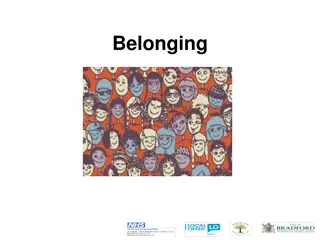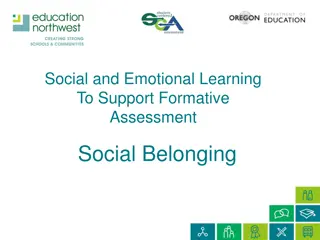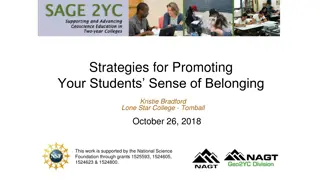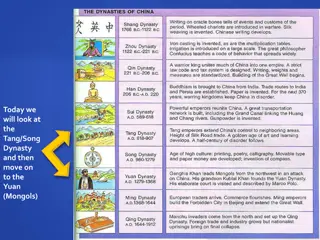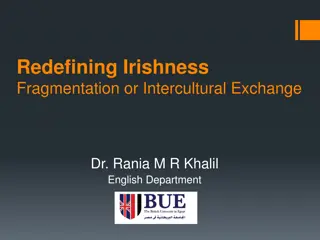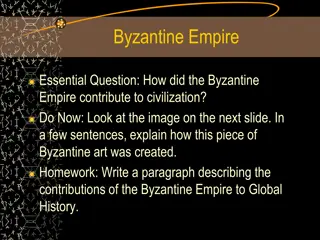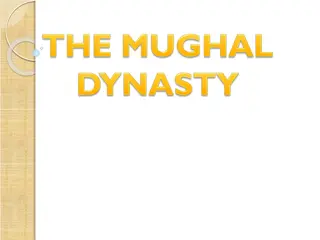Exploring Identity and Belonging in "Remembering Empire: Les Pieds Tanqués
Dive into the complex themes of immigration, home, and conflicting memories in "Remembering Empire: Les Pieds Tanqués." Through the characters' experiences and discussions, questions on belonging, cultural identity, and the impact of colonization are explored, inviting readers to reflect on what defines home and one's sense of belonging.
Uploaded on Sep 17, 2024 | 0 Views
Download Presentation

Please find below an Image/Link to download the presentation.
The content on the website is provided AS IS for your information and personal use only. It may not be sold, licensed, or shared on other websites without obtaining consent from the author. Download presentation by click this link. If you encounter any issues during the download, it is possible that the publisher has removed the file from their server.
E N D
Presentation Transcript
REMEMBERING EMPIRE LES PIEDS TANQU S S E S S I O N 8
LES PIEDS TANQUS (2012) This session: Pages: pp. 12-18 in the printable version of the play. Themes: Immigration, home, conflicting memories Online Sections: 5. Z s pied-noir experience (until Je l ai pas connu, alors des fois je le fais un peu parler) 6. Loule s experience as a Marseillais (until Loule exc d quitte le terrain.) 7. Monsieur Blanc s father (until depuis un h licopt re)
CHEZ NOUS Read: page 12 until Je sais me me pas par quel miracle ! We read about Z s experiences from the pied-noir perspective. Z Sauf que nous, on n tait pas des colons. On tait des pauvres gens qu on a chass s de chez nous. Yaya Sauf que vous n tiez pas chez vous ! Z (il se l ve et se dirige vers Yaya) On n tait pas chez nous ? Apr s cinq ou six g n rations ! On n tait pas chez nous ? Tu veux mon poing dans la gueule ? Why does Z believe Algeria was chez nous and why would Yaya challenge this? In your opinion, when does one have a right to say one is chez soi ?
CHEZ NOUS Why does Z believe Algeria was chez nous and why would Yaya challenge this? As we discussed in earlier sessions, families like Z s often moved to Algeria as a chance to escape poverty or other difficult circumstances. Many lived there for four or five generations before they were forced to leave after the war. In your opinion, when does one have a right to say one is chez soi ? Is it a legal question? Do you have to be a citizen of a country to belong? If you are part of a group that has invaded someone else's country, do you ever have the right to consider it as your home? Or can anyone decide where home is? What might determine your views on this?
CHEZ NOUS Z Et quoi on pouvait croire ? On l a fait ce pays ! On l a construit avec notre sang Yaya Avec le leur aussi. What is Yaya referring to here? Z C tait nous, les Alg riens ! On tait coupable de quoi ? De nous sentir chez nous ? On a invent un pays, une culture ! Des Fran ais, des Italiens, des Grecs, des Maltais, des Espagnols, des Juifs Et tout a grouillait ensemble Je sais m me pas par quel miracle ! Yaya Et neuf millions d Arabes, invisibles vos yeux ! Do you agree with Z that on a invent un pays, une culture ? Why or why not?
CHEZ NOUS Z Et quoi on pouvait croire ? On l a fait ce pays ! On l a construit avec notre sang Yaya Avec le leur aussi. What is Yaya referring to here? Yaya is referring to the fact that many Arabs and Berbers died as a result of the invasion and colonisation. Do you agree with Z that on a invent un pays, une culture ? Why or why not? The settlers contributed to the creation of a specific culture and state in Algeria. However, there were indigenous cultures and populations present before the French arrival. Z is choosing to ignore the fact that the French destroyed those pre-colonial cultures.
Read: the rest of page 12 and page 13 until Z retourne sasseoir, effondre. Un temps. Watch: Video link here 00:27:00-00:29:00 Discuss: 1. What are the two opposing views of the relationship between the pieds-noirs and the indigenous peoples in Algeria? 2. How is this dispute represented in the movements and voices of the characters in this scene? 3. What is a mission civilisatrice ?
1. What are the two opposing views of the relationship between the pieds-noirs and the indigenous peoples in Algeria? Z asserts that his family like other settlers respected and were friends with the indigenous peoples in Algeria. Yaya argues that the indigenous people were only liked if they were silent, knew their place as subordinate to the settlers, and worked hard. 2. How is this dispute represented in the movements and voices of the actors in this scene? Consider the volume, the agitated nature of the gestures, the exasperation, their physical distance.
'LA MISSION CIVILISATRICE ' France s colonial ideology was based on a belief in its civilising mission , the nineteenth-century notion that, as a culturally sophisticated European country, France had a duty to bring the benefits of civilisation to less developed parts of the world. These benefits included Christianity, education, medicine and technology but in reality they were used as justification for exploitative colonial practices that enriched France and subjugated indigenous peoples to French rule. Discuss: 1. In your opinion, are the realities of the mission civilisatrice compatible with France s values of libert , galit , fraternit ? Why/Why not? 2. Given the original injustice of conquest and the strength of opposition from the settlers, do you think a just relationship between Algeria s inhabitants was ever possible?
E XC E R P T F O C U S : P O L I T I C S O F R E P E N TA N C E Read: p. 13 Loule ( Yaya) Tu cherches lui mettre sur le dos la politique coloniale de la France depuis un si cle, hein ? C est a ? Et pourquoi pas la traite des Noirs aussi pendant que tu y es ? Et puis l extermination des Indiens, des Canaques, des Maoris, des Malgaches (s excitant peu peu) L accaparation des terres australes, des for ts tropicales, le pillage des mines et tout le con de Manon ! Le viol des femmes-girafes, Tintin au Congo, Yabon Banania ! [ ] Moi, le repr sentant de l Homme blanc, le descendant du grand Satan, l Occidental, le cousin de l oncle Sam : la pire esp ce ! Qui devrait ternellement payer pour des si cles de m chancet ? Yaya has attempted to make other characters feel guilty. Loule accuses Yaya of blaming Z for all of the evils of French colonial policy and, beyond that, Western imperialism. Loule makes this point by exaggerating the list of crimes for which he claims the white man is held responsible, ridiculing the idea of holding a single white Western individual responsible. Look at these examples referenced by Loule on the next slide. What are your thoughts on them and Loule s reaction? Note, these images contain offensive stereotyped depictions of blackness.
E X C E R P T F O C U S : L H O S P I TA L I T P R O V E N A L Read: second half of page 14 and page 15 until Loule exc de quitte le terrain . Z Mais je vais t en parler de moi, parce que tes insinuations elles commencent me courir Nous, les Pieds-Noirs, on peut pas vraiment dire qu on a t bien re u quand on est arriv ici, une main devant une main derri re. L hospitalite proven ale ? C est pas ce qui nous a saute la figure quand on a d barque Marseille ! From what you have learnt so far, why do you think Z says that the pieds-noirs weren t welcomed when they arrived in France?
LHOSPITALIT PROVENAL Leaving Algeria in haste with few belongings, many pieds-noirs found themselves in search of accommodation and jobs on their arrival in France. But with 600,000 arriving in France in the spring of 1962, the available resources were stretched to breaking point. Marseille, a city of 600,000 at the time, saw its population double. The local population quickly became exhausted by the repatriates and their needs and many of those living in Marseille shared the communist anti-colonial sympathies of Loule s father. Later in the 1960s, hundreds of thousands of Algerian Muslim men also arrived in Marseille, seeking work. France was booming economically and wanted labourers for its construction sites. Many French citizens found the influx of Algerian workers difficult to reconcile with the war which Algerians had fought for independence. They found it difficult to understand why people who had fought for independence now wanted jobs in France. Why might Algerians have looked for work in France? Think about how the Algerian economy might have been destabilised by independence.
QUILS RESTENT CHEZ EUX Loule - Qu ils restent chez eux Tous ceux qui pensent que cette terre d accueil leur est due, qu elle leur est redevable de quelque chose, coupable de les avoir asservis, de les avoir trahis ! Ils viennent manger aux vieilles mamelles sur lesquelles ils ont crach , ils veulent encore en profiter, hein ? Et nous faire payer Monsieur Blanc Vous e tes en col re Loule, vous ne pensez pas ce que vous dites ! Loule Et les derniers en date, l ! Ceux qui croient que cette terre leur appartient parce qu ils en ont achet un morceau, qui ne voient ici qu un champ qu on pourrait b tonner l infini, un vaste parc d attraction, o moi je ferais le singe ! Monsieur Blanc C est moi, le dernier en date ? Why would Monsieur Blanc sense that Loule is referring to him here?
QUILS RESTENT CHEZ EUX Loule arguing that those from Provence feel that their homeland is being changed by waves of incomers, whether immigrants, refugees or bourgeois Parisians relocating to a Provencal Disneyland. As M. Blanc has recently come from Paris to buy land to build on, probably for a holiday home, he senses that this is referring to people like him. It's unusual to hear the same language used for immigrants and rich second home-owners but Loule resents both groups. In your opinion, do we still hear arguments like this today?
Watch the scene and describe how the emotions are represented: Video link here 00:34:00-00:36:00 Why does the audience laugh at Z and M. Blanc s reactions to the petit monde comments and Loule s responses? Z senses he, or at least the pieds-noirs, are being targeted in Loule s comments about those who came and took over space and resources in Provence. M. Blanc senses that he too is being targeted by Loule due to his comment about the wealthy outsiders coming and buying up and building on his native land. When challenged by both Z and M. Blanc on this, Loule insists he doesn t mean them specifically. It is comical that he accuses the groups to which they belong but is quick to say that the individuals standing in front of him don t count.
G R O U P S T U D Y : M O N S I E U R B L A N C S F A T H E R In groups, read: end of pp. 16-18 / end of online section 7 Group 1: 'mon p re aussi tait juste un homme' to 'Monsieur Blanc: oui' Group 2: 'Monsieur Blanc continue' to 'Voyez-vous, comme Camus : il s'est tu.' Group 3: 'Loule : pourquoi il n'a pas d missionn ?' to 'depuis un h licoptre' Describe what we learn in each of your sections about M. Blanc's father. How is empathy created for M. Blanc s father in this scene despite his role?
G R O U P S T U D Y : M O N S I E U R B L A N C S F A T H E R Group 1: 'mon p re aussi tait juste un homme' to 'Monsieur Blanc: oui M. Blanc does know more about his father than he claimed before. His father was in charge of an interrogation (torture) centre in Algeria. He believed that he was fighting for his country. Group 2: 'Monsieur Blanc continue' to 'Voyez-vous, comme Camus : il s'est tu. M. Blanc s father had been captured and tortured during WWII. He was also sent to fight in Indochina where he was sent to a re-education (torture) camp in Vietnam. He nearly died several times for France. Ultimately, he killed himself from shame at the actions he had been ordered to carry out. Group 3: 'Loule : pourquoi il n'a pas d missionn ?' to 'depuis un h licoptre M. Blanc s father was involved in the torture of those questioned by the French forces. He was reluctant to use torture but didn t step down for fear that someone worse would replace him.
FICHE DE LECTURE Update the fiche de lecture on the play. Discuss what you can include with a partner or a group then share your ideas.
CHARACTER PROFILES Update your character profiles based on what you have read this week. Discuss what you can include with a partner or a group then share your ideas.


